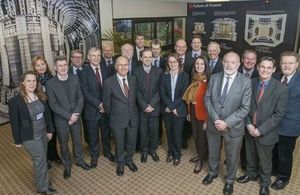The UK’s two premier nuclear labs forge closer links
UKAEA and NNL Boards meet to discuss collaboration

UKAEA & NNL Joint Board meeting - January 2015
Last week saw a joint board meeting between UK Atomic Energy Authority (UKAEA) and the National Nuclear Laboratory (NNL). This gave members of both boards a chance to discuss synergies between the two organisations and identify opportunities for further collaboration.
One area of collaboration is advance materials research. UKAEA and NNL are already working together as part of the government’s National Nuclear Users Facility (NNUF). UKAEA is building a new Materials Research Facility (MRF) at Culham, which will allow scientists from universities and industry to study low active materials. This will be complemented by NNL’s sister facility at Sellafield, for high active materials. In the spring a team of materials scientist from NNL will be co-locating with UKAEA’s materials team at Culham.
Another area of collaboration is the Remote Application in Challenging Environments (RACE) centre. UKAEA has many years’ experience of remote operations on JET, the world’s largest fusion device, using robotics. This can be applied to the next generation of fusion devices ITER and DEMO as well as decommissioning of fission reactors, space and other high hazardous areas.
Part of the Board meeting was dedicated to tours of facility at the Culham Centre for Fusion Energy (CCFE) including the multi-million MAST-Upgrade project, the Materials Research Laboratory and JET.
UKAEA Chairman, Roger Cashmore said
With UKAEA’s increasing focus on technology areas, notably the MRF and RACE, the overlap of our work with fission research and the areas of work at NNL is ever more evident. I was pleased with the wide ranging discussions we had and feel we are ready to move forward with NNL in wider collaborations.
NNL Chairman Richard Maudslay said:
I found the NNL Board visit to UKAEA at Culham most informative. Our two organisations have complementary skills and expertise in our respective areas of nuclear fission and fusion, but of course there are also areas which cut across both sectors. We were pleased to identify a number of these and to put plans in place for mutual co-operation, starting with our work on materials and on robotics. I am looking forward to seeing this joint work bear fruit.